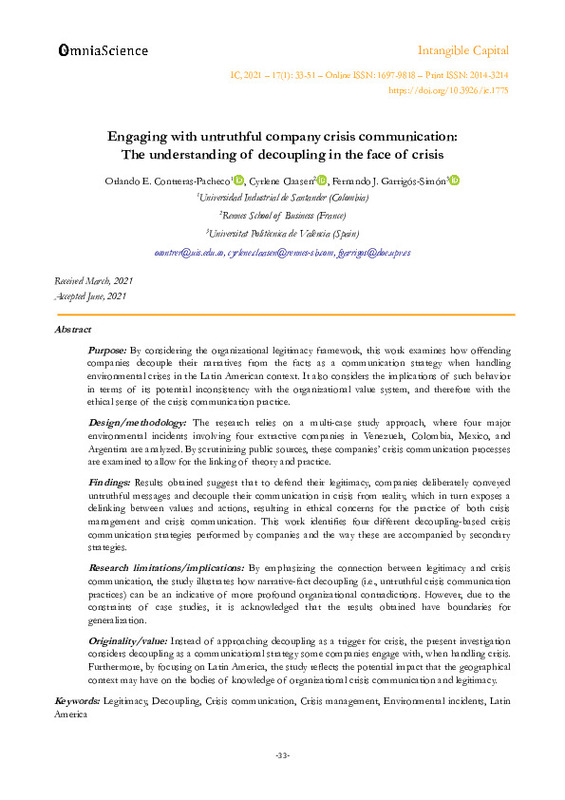JavaScript is disabled for your browser. Some features of this site may not work without it.
Buscar en RiuNet
Listar
Mi cuenta
Estadísticas
Ayuda RiuNet
Admin. UPV
Engaging with untruthful company crisis communication: The understanding of decoupling in the face of crisis
Mostrar el registro sencillo del ítem
Ficheros en el ítem
| dc.contributor.author | Contreras-Pacheco, Orlando E.
|
es_ES |
| dc.contributor.author | Claasen, Cyrlene
|
es_ES |
| dc.contributor.author | Garrigós Simón, Fernando José
|
es_ES |
| dc.date.accessioned | 2022-11-07T16:34:31Z | |
| dc.date.available | 2022-11-07T16:34:31Z | |
| dc.date.issued | 2021 | es_ES |
| dc.identifier.issn | 1697-9818 | es_ES |
| dc.identifier.uri | http://hdl.handle.net/10251/189352 | |
| dc.description.abstract | [EN] Purpose: By considering the organizational legitimacy framework, this work examines how offending companies decouple their narratives from the facts as a communication strategy when handling environmental crises in the Latin American context. It also considers the implications of such behavior in terms of its potential inconsistency with the organizational value system, and therefore with the ethical sense of the crisis communication practice. Design/methodology: The research relies on a multi-case study approach, where four major environmental incidents involving four extractive companies in Venezuela, Colombia, Mexico, and Argentina are analyzed. By scrutinizing public sources, these companies¿ crisis communication processes are examined to allow for the linking of theory and practice. Findings: Results obtained suggest that to defend their legitimacy, companies deliberately conveyed untruthful messages and decouple their communication in crisis from reality, which in turn exposes a delinking between values and actions, resulting in ethical concerns for the practice of both crisis management and crisis communication. This work identifies four different decoupling-based crisis communication strategies performed by companies and the way these are accompanied by secondary strategies. Research limitations/implications: By emphasizing the connection between legitimacy and crisis communication, the study illustrates how narrative-fact decoupling (i.e., untruthful crisis communication practices) can be an indicative of more profound organizational contradictions. However, due to the constraints of case studies, it is acknowledged that the results obtained have boundaries for generalization. Originality/value: Instead of approaching decoupling as a trigger for crisis, the present investigation considers decoupling as a communicational strategy some companies engage with, when handling crisis. Furthermore, by focusing on Latin America, the study reflects the potential impact that the geographical context may have on the bodies of knowledge of organizational crisis communication and legitimacy. | es_ES |
| dc.description.sponsorship | The authors received financial support from the Universidad Industrial de Santander (Colombia) for the research, authorship, and publication of this article | es_ES |
| dc.language | Inglés | es_ES |
| dc.publisher | Omnia Publisher SL | es_ES |
| dc.relation.ispartof | Intangible Capital | es_ES |
| dc.rights | Reconocimiento - No comercial (by-nc) | es_ES |
| dc.subject | Legitimacy | es_ES |
| dc.subject | Decoupling | es_ES |
| dc.subject | Crisis communication | es_ES |
| dc.subject | Crisis management | es_ES |
| dc.subject | Environmental incidents | es_ES |
| dc.subject | Latin America | es_ES |
| dc.title | Engaging with untruthful company crisis communication: The understanding of decoupling in the face of crisis | es_ES |
| dc.type | Artículo | es_ES |
| dc.identifier.doi | 10.3926/ic.1775 | es_ES |
| dc.rights.accessRights | Abierto | es_ES |
| dc.description.bibliographicCitation | Contreras-Pacheco, OE.; Claasen, C.; Garrigós Simón, FJ. (2021). Engaging with untruthful company crisis communication: The understanding of decoupling in the face of crisis. Intangible Capital. 17(1):31-51. https://doi.org/10.3926/ic.1775 | es_ES |
| dc.description.accrualMethod | S | es_ES |
| dc.relation.publisherversion | http://dx.doi.org/10.3926/ic.1775 | es_ES |
| dc.description.upvformatpinicio | 31 | es_ES |
| dc.description.upvformatpfin | 51 | es_ES |
| dc.type.version | info:eu-repo/semantics/publishedVersion | es_ES |
| dc.description.volume | 17 | es_ES |
| dc.description.issue | 1 | es_ES |
| dc.relation.pasarela | S\462897 | es_ES |
| dc.contributor.funder | Universidad Industrial de Santander, Colombia | es_ES |








